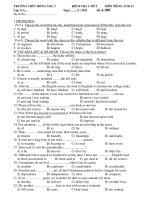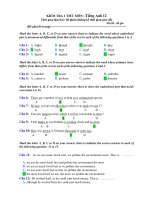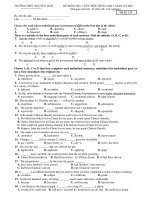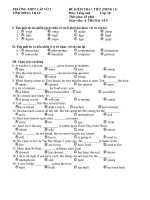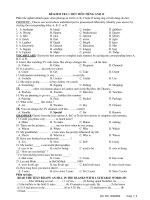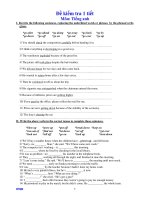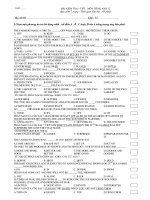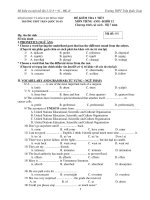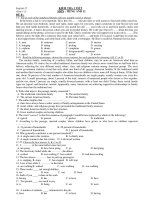ĐỀ KIỂM TRA 1 TIẾT Môn: TIẾNG ANH 12 - MÃ ĐỀ 123 pot
Bạn đang xem bản rút gọn của tài liệu. Xem và tải ngay bản đầy đủ của tài liệu tại đây (104.88 KB, 2 trang )
SỞ GD & ĐT QUẢNG NGÃI
TRƯỜNG THPT NGUYỄN CÔNG PHƯƠNG
MÃ ĐỀ 123
ĐỀ KIỂM TRA 1 TIẾT
Môn: TIẾNG ANH 12
Thời gian làm bài: 45 phút
Họ, tên: Lớp: Số báo danh:
(Đề kiểm tra gồm 40 câu hỏi, HS làm bài trên phiếu trả lời trắc nghệm).
I/ PRONUNCIATION:
1.a. eleven b. history c. nursery d. different
2. a. certificate b. necessary c. economy d. geography
3.a. employment b. remember c. concentrate d. position
4.a. cooks b. loves c. joins d. spends
5.appeared b. agreed c. coughed d. loved
II/ VOCABULARY AND EXPRESSIONS :
6.Fee-paying schools, often called “independent schools”, “private schools” or “…. Schools”
a. college b. primary c. secondary d. public
7.She reads newspapers every day to look for the vacant _______ for which she can apply.
a. institutions b. indications c. positions d. locations
8.A letter of _______ is sometimes really necessary for you in a job interview.
a. recommend b. recommended c. recommender d. recommendation
9.Before the interview, you have to send a letter of application and your résumé to the company.
a. recommendation b. reference c. curriculum vitae d. photograph
10 ______ is increasing, which results from economic crisis.
a. Employment b. Unemployment c. Employ d. Unemployed
III/ GRAMMAR :
11.Ms Young, to _______ many of her students are writing, is living happily and peacefully in
Canada.
a. who b. whom c. that d. whose
12.I saw a lot of new people at the party, _______ seemed familiar.
a. some of whom b. some of who c. whom d. some of that
13.My friend eventually decided to quit her job, _______ upset me a lot
a. that b. when c. which d. who
14.He is the man _______ car was stolen last week.
a. whom b. that c. which d. whose
15.It was the worst winter ____ anyone could remember.
a. when b. which c. where d. why
16.I would like to know the reason _______ he decided to quit the job.
a. why b. which c. that d. when
17.She always had wanted to go to places _______ she could speak her native tongue.
a. that b. in that c. which d. where
18.February is the month ____ many of my colleagues take skiing holidays.
a. when b. that c. in that d. which
19. If I _______ 10 years younger, I _______ the job.
a. am / will take b. was / have taken c. had been / will have taken d. were / would take
20._______ more carefully, he would not have had the accident yesterday:
a. If Peter driven b. If had Peter driven c. Had Peter driven d. Unless Peter had driven
21. If you want to see clearly, you _____ your glass.
a. wear b. will wear c. would wear d. must wear
22. If you’re scared of spiders, _____ into the garden.
a. won’t go b. you won’t go c. don’t go d. not go
23.All bottles _______ before transportation.
a. frozen b. were froze c. were frozen d. are froze
24.The trees _______.
a. were grown by John yesterday in the backyard
b. were grown in the backyard by John yesterday
c. were grown in the backyard yesterday by John
d. in the backyard were grown yesterday by John
25._______ yet?
a. Have the letters been typed b. Have been the letters typed
c. Have the letters typed d. Had the letters typed
IV/WRITING :
26. Somebody cleans the room every day.
A. The room everyday is cleaned. B. The room is every day cleaned.
C. The room is cleaned every day. D. The room is cleaned by somebody every day.
27. People don’t use this road very often.
A. This road is not used very often. B. Not very often this road is not used.
C. This road very often is not used. D. This road not very often is used.
28. How do people learn languages?
A. How are languages learned? B. How are languages learned by people?
C. How languages are learned? D. Languages are learned how?
29. We
’
re going to be late if ___.
A. we not leave right now B. we didn
’
t leave right now
C. we won
’
t leave right now D. we don
’
t leave right now
30. It was the first time I have seen a tiger
A. I haven’t seen a tiger before B. I have seen a tiger before
C. I had seen a tiger before D. I saw a tiger before
V/ READING :
A.READING AND FILLING
The interview is one of the most important (31) _____ in the job search process. When an employer
invites you to an interview, he/she is indicating an (32) _____ in yourself. The interview gives both of
you the opportunity to (33) _____ enough information to determine if you are a good “fit” for each
other. Think of an interview as a highly focused professional conversation. You should (34) _____ the
limited amount of time you have learning about the employer’s needs and discuss the ways you can
meet these needs. In many cases, you will interview at least, twice before being employed for a
(35) _____. Once in a brief screening interview and at least once again in a more serious meeting when
you may also talk to many of your potential coworkers.
31. A. parts B. roles C. fields D. facts
32. A. interest B. interesting C. interested D. interestingly
33. A. fill B. change C. exchange D. translate
34. A. make B. spend C. post D. apply
35. A. condition B. location C. satisfaction D. position
B. READING AND CHOOSE THE BEST ANSWER :
Parents send their children to school to prepare for the time when they grow up. Children learn
their native language so that they will be able to communicate fluently with other people around them
.Moreover, they can preserve the valuable culture and literature of their country. They learn foreign
languages in order to benefit from other country’s heritage .The more foreign languages they learn ,the
more benefits they get .Children also learn maths to calculate ,geography to know about nature ,and
history to know about human beings and historical events .Nearly everything they study at school has
some practical uses in their life.
36. How many school subjects are mentioned in the passage?
A. five B. six C. seven D. four
37. According to the passage ,children learn history to know about
A. the mankind B. events of the history. C. people and historical events. D. practical uses of life
38. Why do children have to learn their native language ?
A. To learn foreign languages B. To communicate fluently with other people around them.
C. To know about nature D. To benefit from foreign countries’ heritage
39. Most of the things children learn at school
A. are useless B. have no use C. are not necessary D. have some practical uses.
40. Parents send their children to school to
A. learn English B. make them grow up C. prepare for their future D. play better .
The end
